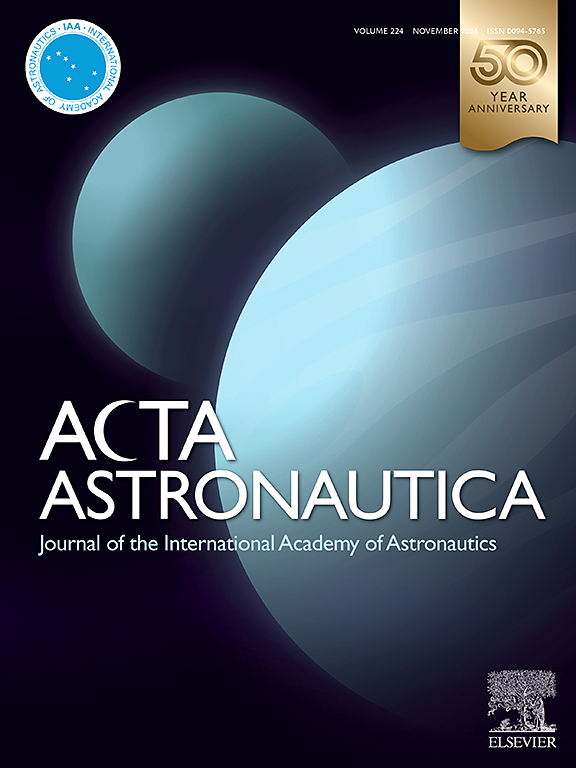Improving landing stability and terrain adaptability in Lunar exploration with biomimetic lander design and control
IF 3.1
2区 物理与天体物理
Q1 ENGINEERING, AEROSPACE
引用次数: 0
Abstract
Traditional lunar landers face challenges due to strict flatness requirements at landing sites and the need to avoid complex terrains, which significantly limits their exploration capabilities and success rates. Additionally, their focus on stable landings often compromises their maneuverability, reducing adaptability to various lunar terrains. To address these issues, this study introduces a walkable cat-legged lander (WCLL) inspired by feline landing mechanisms. The WCLL integrates features from both traditional landers and rovers, enabling it to perform high-load landings and navigate effectively across diverse lunar surfaces. It utilizes magnetorheological dampers to dissipate impact energy and employs a soft-landing control method, achieving stable landings under various conditions, including vertical velocities of 3 m/s, payloads of 1280 kg, slopes of 15°, and horizontal disturbances at speeds of 2 m/s. Compared to the Chang'e−3 lander, the WCLL shows a 66.7 % increase in slope adaptability and a 22.6 % improvement in resistance to horizontal disturbances. Finally, experimental validation confirms the accuracy of the simulation model, providing valuable insights for future lunar exploration robot design.
利用仿生着陆器的设计和控制提高月球探测的着陆稳定性和地形适应性
传统的月球着陆器由于对着陆点的平整度有严格要求,而且需要避开复杂地形,因此面临着挑战,这大大限制了它们的探测能力和成功率。此外,它们对稳定着陆的关注往往会影响其机动性,降低对各种月球地形的适应性。为了解决这些问题,本研究受猫科动物着陆机制的启发,推出了可行走猫腿着陆器(WCLL)。WCLL 融合了传统着陆器和漫游车的特点,使其能够执行高负荷着陆,并在各种月球表面有效导航。它利用磁流变阻尼器消散撞击能量,并采用软着陆控制方法,可在各种条件下实现稳定着陆,包括垂直速度 3 米/秒、有效载荷 1280 千克、坡度 15°以及速度 2 米/秒的水平干扰。与嫦娥三号着陆器相比,WCLL的斜坡适应能力提高了66.7%,抗水平干扰能力提高了22.6%。最后,实验验证证实了模拟模型的准确性,为未来月球探测机器人的设计提供了宝贵的启示。
本文章由计算机程序翻译,如有差异,请以英文原文为准。
求助全文
约1分钟内获得全文
求助全文
来源期刊

Acta Astronautica
工程技术-工程:宇航
CiteScore
7.20
自引率
22.90%
发文量
599
审稿时长
53 days
期刊介绍:
Acta Astronautica is sponsored by the International Academy of Astronautics. Content is based on original contributions in all fields of basic, engineering, life and social space sciences and of space technology related to:
The peaceful scientific exploration of space,
Its exploitation for human welfare and progress,
Conception, design, development and operation of space-borne and Earth-based systems,
In addition to regular issues, the journal publishes selected proceedings of the annual International Astronautical Congress (IAC), transactions of the IAA and special issues on topics of current interest, such as microgravity, space station technology, geostationary orbits, and space economics. Other subject areas include satellite technology, space transportation and communications, space energy, power and propulsion, astrodynamics, extraterrestrial intelligence and Earth observations.
 求助内容:
求助内容: 应助结果提醒方式:
应助结果提醒方式:


